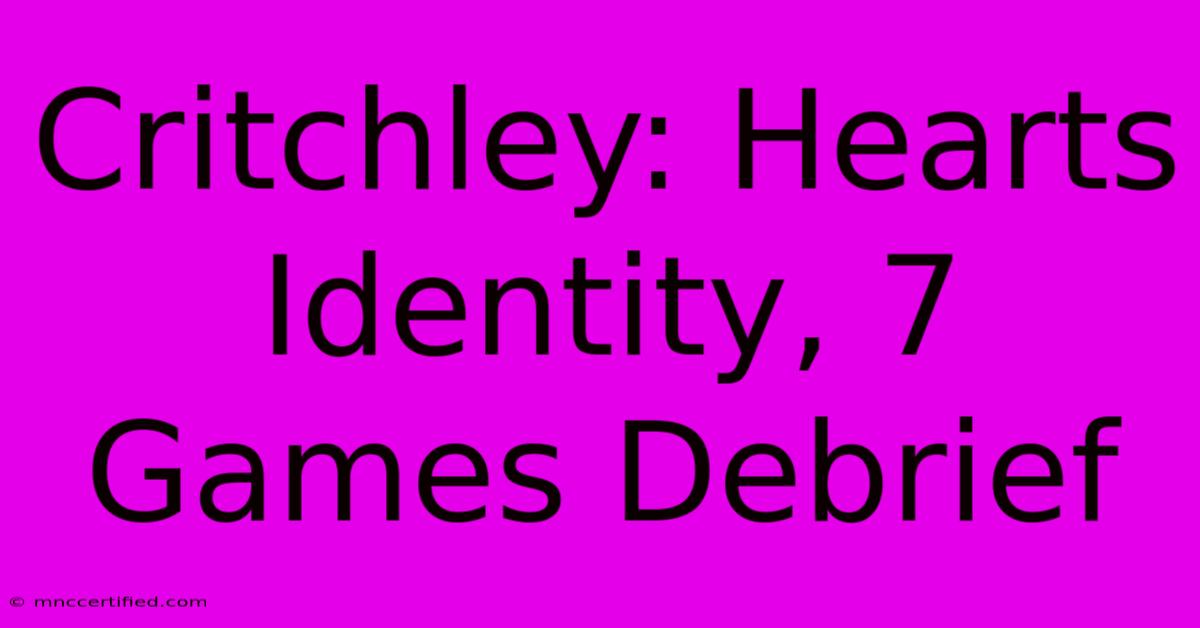Critchley: Hearts Identity, 7 Games Debrief

Table of Contents
Critchley: Hearts Identity, 7 Games Debrief – A Deep Dive into the Gameplay and Psychological Impact
Simon Critchley's Hearts Identity: Seven Games isn't just a collection of philosophical games; it's a provocative exploration of selfhood, identity, and the limits of language. This debrief will delve into the key themes and mechanics of each game, examining their psychological impact and how they contribute to Critchley's larger project. We'll also explore how to effectively discuss and analyze these challenging games in academic and casual settings.
Understanding the Context: Critchley's Philosophical Framework
Before diving into the individual games, understanding Critchley's philosophical underpinnings is crucial. His work draws heavily on Lacanian psychoanalysis, emphasizing the fragmented and inherently unstable nature of the self. The games, therefore, aren't designed for mere entertainment but as tools to experience this instability firsthand. They force players to confront the limitations of language and the inherent difficulties in articulating one's own identity. This makes Hearts Identity a unique contribution to both philosophy and game studies.
The Seven Games: A Detailed Analysis
Each game presents a unique challenge, forcing players to grapple with different aspects of identity and communication. Here's a breakdown:
Game 1: The Name Game
This seemingly simple game highlights the limitations of naming and categorization. The inability to fully capture the essence of a person through a name foreshadows the larger project of the book. Keywords: Naming, Identity, Language, Categorization, Limitation.
Game 2: The Mirror Game
The Mirror Game directly confronts the Lacanian concept of the mirror stage. Players confront their own reflections, literally and metaphorically, grappling with the constructed nature of the self. Keywords: Mirror Stage, Lacan, Self-perception, Reflection, Constructed Identity.
Game 3: The Portrait Game
This game emphasizes the limitations of representation. Trying to accurately portray someone else highlights the subjective nature of perception and interpretation. Keywords: Representation, Subjectivity, Interpretation, Perception, Portraiture.
Game 4: The Lie Game
The Lie Game forces participants to confront the pervasive nature of deception, both within ourselves and in our interactions with others. It explores how lies can shape and distort identity. Keywords: Deception, Honesty, Truth, Self-deception, Identity Distortion.
Game 5: The Question Game
This game showcases the power of questioning and its ability to both reveal and obscure identity. The open-ended nature of the questions emphasizes the impossibility of definitive answers. Keywords: Questioning, Open-endedness, Uncertainty, Ambiguity, Revelation.
Game 6: The Silence Game
The Silence Game highlights the role of silence in communication and self-discovery. It reveals how silence can both conceal and reveal aspects of identity. Keywords: Silence, Communication, Nonverbal Communication, Self-discovery, Concealment.
Game 7: The Story Game
The final game, the Story Game, emphasizes the narrative construction of identity. Through storytelling, individuals create and reinforce their sense of self. Keywords: Narrative, Storytelling, Identity Construction, Self-narrative, Memory.
Analyzing and Discussing Critchley's Work
Effectively discussing Hearts Identity requires careful consideration of both the gameplay and the philosophical underpinnings. Here are some points to consider:
- The subjective experience: Each player's experience will be unique. Focus on individual interpretations and feelings rather than seeking definitive answers.
- The philosophical context: Ground your analysis in Critchley's philosophical framework, referencing relevant concepts from Lacanian psychoanalysis.
- The role of language: Pay close attention to the limitations and possibilities of language in shaping and expressing identity.
- The ethical implications: Consider the ethical implications of the games and their potential impact on players.
Conclusion: Beyond the Games
Critchley's Hearts Identity is not just a collection of games; it's a powerful and insightful exploration of the human condition. By engaging with these games and critically analyzing their impact, we gain a deeper understanding of the complexities of identity, communication, and the self. The enduring legacy of Hearts Identity lies in its ability to provoke thought, spark conversation, and challenge our assumptions about who we are. This debrief serves as a starting point for further exploration and critical engagement with this challenging and rewarding work.

Thank you for visiting our website wich cover about Critchley: Hearts Identity, 7 Games Debrief. We hope the information provided has been useful to you. Feel free to contact us if you have any questions or need further assistance. See you next time and dont miss to bookmark.
Featured Posts
-
Hawkeyes Win Stevens Leads Rush
Nov 24, 2024
-
Oakbridge Insurance Columbus Ms
Nov 24, 2024
-
Goss Logan Insurance Lebanon Nh
Nov 24, 2024
-
Insurance Shoppers Brewer Maine
Nov 24, 2024
-
Everton 0 0 Brentford Game Review
Nov 24, 2024